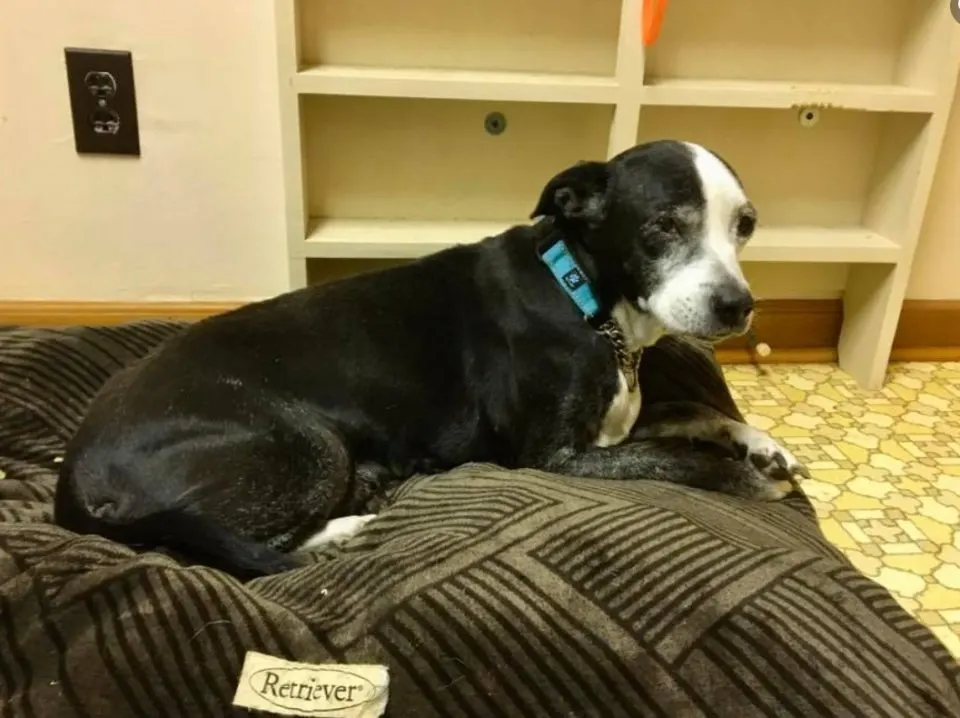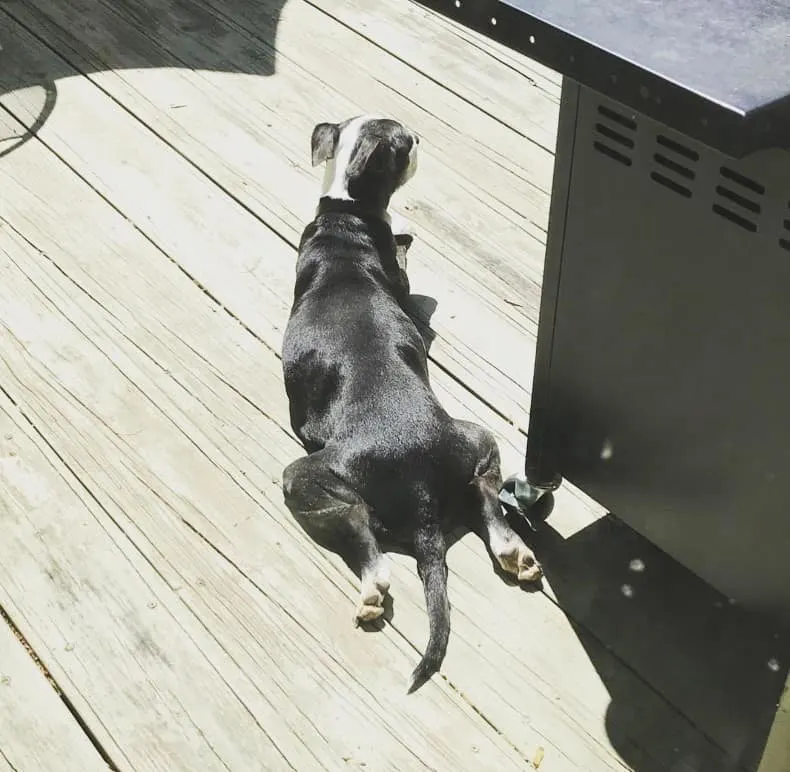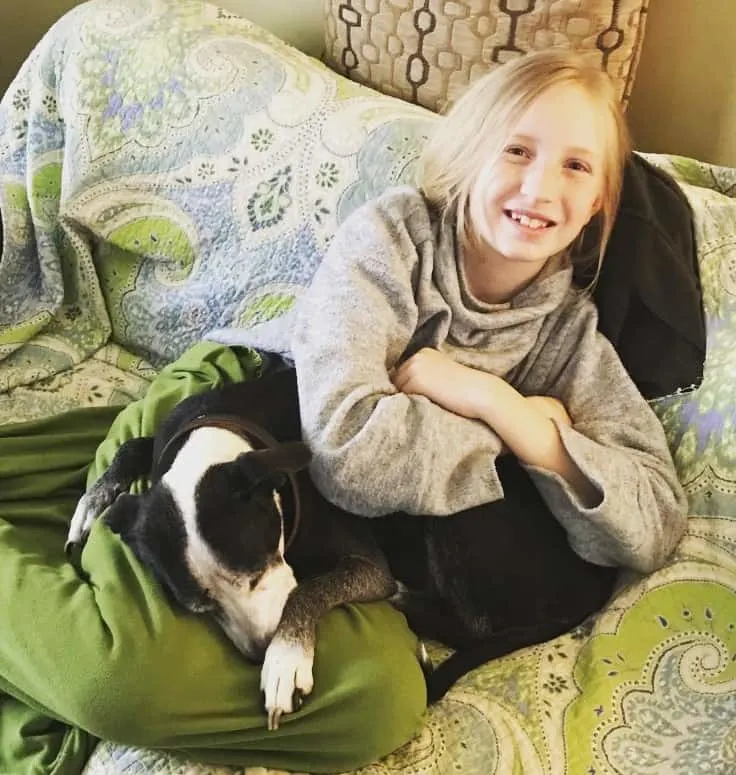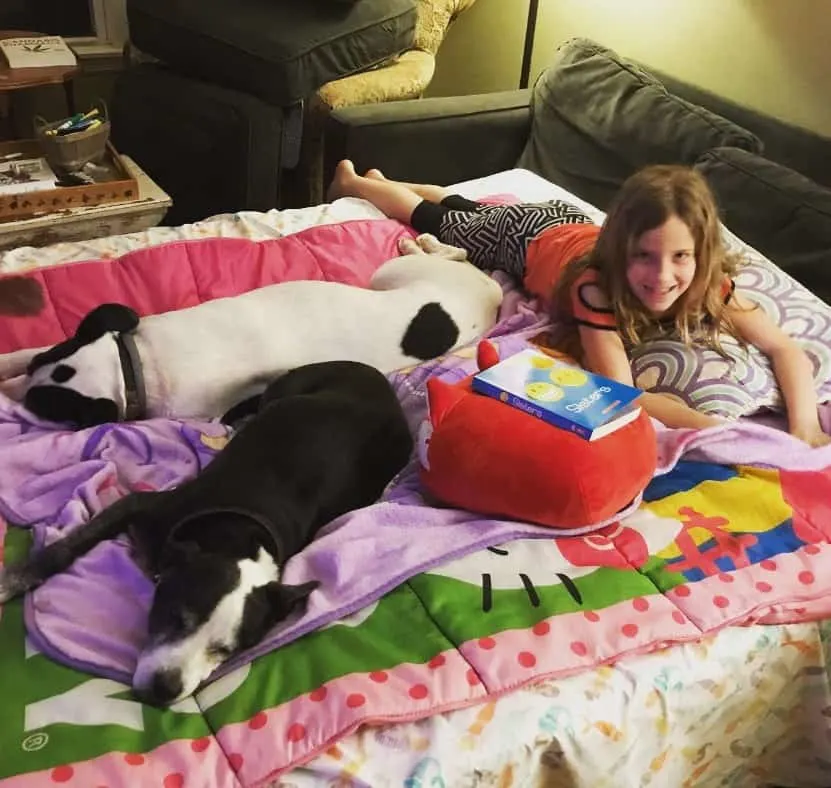There’s an absolutely absurd stereotype in this world, saying that old dogs are “just not worth the time.” Due to this belief, many owners decide to euthanize their senior pets instead of taking care of them, even though the pets don’t necessarily cope with some condition.
Every year, out of approximately 3 million dogs in shelters in the U.S., around 390,000 dogs are euthanized, according to statistics.
Several years ago, a woman named Melissa, from Conyers, Georgia, decided to do something about it. She started a facility called Old Dog Home on her 11-acre yard, which helps senior doggos get, as she says, “a chance at love and family for their last years.”
Still, when she received a call about one senior being unjustifiably set for euthanization at a local shelter, she fell apart. This is why…
Holly Was Brought To Be Euthanized Without A Justifiable Reason

One of Melissa’s veterinary partners from Georgia called her one day to ask if she could take in a dog that was brought to be euthanized by his family.
Even though the dog didn’t suffer from a life-threatening condition, his family decided to put her to sleep because she was peeing on the floor and the grandkids were just not interested in her.
At the time, Melissa didn’t have enough room for one more dog, but she couldn’t stand the idea of a dog being unfairly euthanized; hence, she decided to come and meet this senior doggo girl.

When she finally came to the shelter, she asked a man who was there with his granddaughter to rethink his actions, but he just said that they don’t really like her – they liked their other dogs better.
Melissa was devastated, but still inclined to help the poor doggo girl who she later named “Holly.”
Old Dog Home To The Rescue
I guess it was just meant for Holly to be a part of the Old Dog Home family at the time. This facility in Conyers, Georgia, provided her with a temporary home, and even though she was a little scared at the beginning, she adapted pretty well and started acting all doggo again!
She didn’t suffer from any critical condition, but she was quite filthy, with a few old lady bumps on her body. On top of all that, she had a yeast infection.
She was a really friendly girl who just needed the right family. And, after all this time – she finally got one, at least on a temporary basis!
“Shuffled Like A Tacky Gift No One Wanted Anymore”

As Melissa found out, Holly was shuffled around from place to place until she finally wound up with her last family. She belonged to someone in the past, but as it turns out, her original owner passed away, and from that moment, everything went upside down for Holly.
Melissa on her Facebook:
“She’s been shuffled around again like a tacky gift no one wanted in the first place… She relaxed a little… I whispered to her and promised her that from now on, she will always be loved and wanted, no matter what.”
Luckily, she couldn’t have ended up in a better place! Old Dog Home provided her with endless love and plenty of space to relax in. Holly was finally becoming her old self, and even though she was around 10 to 12 years old, she never stopped being enthusiastic about life!
Finally In The Right Family

Just five months after she was originally rescued by Melissa, Holly got a new home. She was taken in by the pawfect family with two girls and a dog who welcomed Holly with arms wide open!

“Look at this baby girl now living her BEST LIFE. Frog legs, snuggling with her girls, basking in the sun… she’s happy and healthy and making sure her family’s little farm is running smoothly. I can’t tell y’all how happy it makes my heart to see her looking so good,” Melissa wrote.
It took a long path and a couple of rough years, but Holly was finally where she was always supposed to be – in the arms of a loving family!
If you’ve ever noticed your furry friend yawning more than usual, you might be wondering what’s behind all those big yawns. Dogs, much like humans, use yawning as a form of communication, but there could be more to it than just tiredness. When your canine companion starts yawning excessively, it could be a sign of various underlying reasons that go beyond just feeling sleepy.
As a seasoned dog trainer, you’ve probably picked up on the subtle cues your dog gives off, and excessive yawning is no exception. Understanding the reasons behind your dog’s frequent yawning can provide valuable insights into their well-being and emotions. So, the next time you catch your pup in a yawning frenzy, there might be more to it than meets the eye.
Understanding Dog Yawns
The Science Behind A Dog’s Yawn
When your dog yawns, it’s not just a sign of tiredness—it can also be a way for them to communicate their feelings. Dogs often yawn to show stress, anxiety, or even to calm themselves down in a situation. Yawning can also be contagious among dogs, just like it is among humans. So, next time you see your furry friend yawning, consider it as a signal of their emotional state rather than just sleepiness.
Yawning as a Form of Communication
For dogs, yawning serves as a form of non-verbal communication. It can indicate various things, such as feeling overwhelmed, uncertain, or seeking reassurance. By paying attention to your dog’s yawning patterns, you can better understand their needs and emotions. So, if you notice your dog yawning more than usual, it might be time to provide them with some comfort or reassurance to help them feel more at ease.
Common Reasons for Excessive Yawning in Dogs
Stress and Anxiety-Induced Yawning
If your dog is yawning more than usual, it could be a sign of stress or anxiety. Dogs may yawn excessively when they feel uncomfortable in certain situations, such as during thunderstorms, vet visits, or when meeting new people or animals. Pay attention to your dog’s body language along with yawning to understand their stress triggers and help them feel more at ease.
Yawning as a Response to Sleepiness or Boredom
Just like humans, dogs yawn when they’re tired or bored. If your dog isn’t getting enough rest or mental stimulation, they may yawn frequently as a way to cope with sleepiness or monotony. Make sure your dog has enough opportunities for play, exercise, and mental engagement to keep them active and alert, reducing excessive yawning due to boredom.
Health Issues That Can Cause Increased Yawning
Sometimes, excessive yawning in dogs can be linked to underlying health issues. Respiratory problems, allergies, or certain medical conditions may lead to increased yawning as a response to discomfort or pain. If you notice your dog yawning excessively and it’s accompanied by other symptoms like coughing, wheezing, or lethargy, it’s essential to consult your veterinarian for a proper diagnosis and treatment.
Remember, understanding why your dog is yawning excessively can help you address their needs and ensure their overall well-being. By being attentive to their yawning cues and behavior, you can provide the necessary support and care to keep your furry friend happy and healthy.
Behavioral Patterns and Yawning Frequency
When Yawning is Part of Normal Dog Behavior
Yawning is a common behavior in dogs and is often a natural part of their routine. Dogs may yawn when they wake up, before going to sleep, or in response to your yawn. In social settings, dogs use yawning as a way to communicate their feelings and maintain harmony within the group. It’s a normal way for them to release tension or show submission to others. Understanding when yawning is typical in your dog’s behavior can help you interpret their emotions accurately.
Recognizing Abnormal Yawning Patterns
While yawning is usually a regular behavior, excessive or abnormal yawning can indicate underlying issues that need attention. If your dog yawns excessively, especially in situations where they are not tired or relaxed, it could be a sign of stress, anxiety, or discomfort. Additionally, if your dog’s yawning patterns change suddenly or become more frequent than usual, it’s essential to observe other behaviors and consult with a veterinarian to rule out any potential health concerns. Paying attention to these abnormal yawning patterns can help you address your dog’s needs promptly.
Addressing Excessive Yawning in Dogs
Tips to Reduce Stress-Related Yawning
When it comes to helping your dog manage stress-related yawning, creating a calm and secure environment is key. Establishing a routine for feeding, walking, and playtime can provide a sense of stability for your furry friend. Additionally, engaging in interactive play and exercise activities can help reduce stress levels in dogs, minimizing excessive yawning behavior.
Knowing When to Consult a Veterinarian
While occasional yawning is normal, persistent and excessive yawning in dogs may indicate an underlying issue that requires veterinary attention. If you notice your dog yawning excessively, especially in conjunction with other concerning symptoms like lethargy, changes in appetite, or breathing difficulties, it’s essential to consult a veterinarian promptly. A professional evaluation can help identify any potential health issues and ensure that your dog receives the necessary care and treatment.
Conclusion
Your furry friend’s frequent yawning isn’t just about tiredness. It’s their way of telling you how they feel – whether it’s stress, anxiety, or simply seeking comfort. By understanding the reasons behind their excessive yawning, you can create a happier and healthier environment for them. Remember, a calm and structured routine, along with engaging activities, can help reduce their yawning and improve their overall well-being. If you notice persistent yawning or other concerning symptoms, don’t hesitate to reach out to your vet for guidance. Your pup’s yawning habits could be a subtle indicator of an underlying health issue that needs attention. Keep an eye on their yawning patterns and respond with love and care.
Frequently Asked Questions
Why do dogs yawn?
Dogs yawn to communicate emotions like stress, anxiety, or the need for reassurance. Yawning can also be contagious and serves as a non-verbal signal of their emotional state.
What are common reasons for excessive yawning in dogs?
Common reasons for excessive yawning in dogs include stress, anxiety, sleepiness, and boredom. It can also be linked to underlying health issues such as respiratory problems or allergies.
How can I reduce stress-related yawning in my dog?
To reduce stress-related yawning in dogs, create a calm and secure environment, establish routines, and engage in interactive play and exercise activities.
When should I consult a veterinarian about my dog’s yawning?
Consult a vet if your dog exhibits persistent excessive yawning, especially when accompanied by other concerning symptoms like lethargy, changes in appetite, or breathing difficulties, to identify and address potential health issues promptly.
[no_toc]

Hey there, I’m Janet Brooks, a dog-loving student from California. I’m all about helping pups in need, especially those without homes. Me and my awesome friends work together to give shelter and love to stray dogs. Oh, and I also write blogs about dogs to share helpful info.